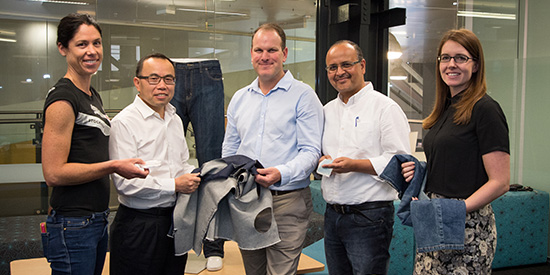Denim goes green thanks to Deakin innovation
Media release'A team from Deakin University's Institute for Frontier Materials (IFM) will put a new spin on vintage denim jeans, all in the name of reducing the huge environmental impact in the life cycle of the world’s most popular clothing item.
The team developed its 'circular denim' idea as an entry into the Global Change Award, an initiative of the H&M Foundation that provides seed funding for projects that promote sustainable fashion.
The unique process will pulverise used denim into ultrafine particles, and then coat or print the colour particles onto undyed new denim to create the typical denim appearance.
Last night, in Stockholm, the team was awarded €150,000, to take their idea to industry, one of five finalists, out of a total of 2885 entries, to share in the international prize.
Team leader Professor Xungai Wang, who heads IFM and the ARC Future Fibres Hub, said on average, the life cycle of a pair of denim jeans produced more than 30 kg of CO2 and used around 3500 litres of water, the equivalent of running 44 baths.
"Denim is the single largest apparel item on the market. Traditional denim production has a serious environmental impact and denim recycling is a huge issue worldwide," Professor Wang said.
"Currently, old denim products are dumped in landfills, and dye run-off from denim production can pollute local water supplies."
Team member Dr Rangam Rajkhowa said IFM's Circular Denim project would address the key issues in denim production, and was likely to significantly cut the water and energy consumption, while creating new fashion effects for denim.
"This way, the old denim is reused, and new denim does not have to be dyed using the traditional yarn dyeing approach which consumes a huge amount of water and energy," he said.
"If necessary, the colour of the fine particles can be enhanced or changed easily before the coating or printing process. This will also help create a new fashion effect for denim products."
More than 450 million denim jeans are sold globally each year and the retail jeans market is estimated to reach US$56 billion by next year.
Professor Wang said the key to the project's success in improving the environmental sustainability of denim production came from the team's unique ability to create ultrafine coloured particles from textiles.
"Our previous work shows that pulverised fibre particles can take up dye under room temperature within five minutes due to very high surface area, hence significantly reducing the energy used to heat water under conventional dyeing process," he said.
"This process also allows dye to be reused, minimising water use and effluent discharge.
"Our 'circular denim' approach is a completely new one, addressing both denim waste and new denim manufacturing at the same time, and we believe it will have a lasting impact on both the environment and the global clothing market."
The team behind the Circular Denim project includes Professor Wang, Dr Rajkhowa, Dr Nolene Byrne, Dr Christopher Hurren and Dr Rebecca Van Amber.
Share this story

